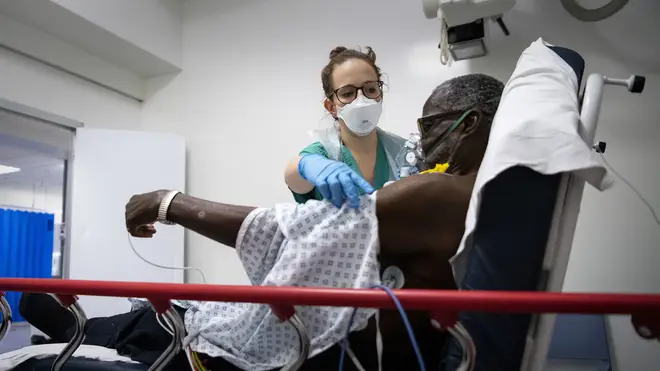
Natasha Devon 6pm - 9pm
9 January 2021, 08:10 | Updated: 9 January 2021, 08:18

The majority of coronavirus patients have at least one ongoing symptom six months after first becoming ill, according to a new study.
The research, published in the Lancet, looked at the long-term effects of Covid-19 on people admitted to hospital in Wuhan, China
It involved 1,733 patients - previously been diagnosed with coronavirus - with a median age of 57 who had been discharged from Jinyintan Hospital in Wuhan in the first half of last year.
In follow-up visits, 76 per cent of the participants reported at least one ongoing symptom of the virus, with fatigue or muscle weakness - the most common - being reported by more than six in 10 people.
Meanwhile, just over a quarter spoke of sleeping difficulties, followed closely by 23 per cent experiencing anxiety or depression.
Read more: UK records 1,325 Covid deaths in highest-ever daily figure
Watch: Harrowing call sets out NHS crisis in London through eyes of one LBC caller

New TV campaign urges public to stay at home
Follow-up visits took place in the latter half of 2020 and included face-to-face interviews using questionnaires to evaluate people's symptoms and health-related quality of life.
They also underwent physical examinations, lab tests, and a six-minute walking test to gauge patients' endurance levels.
Professor Bin Cao, from the National Centre for Respiratory Medicine, China-Japan Friendship Hospital and Capital Medical University, said: "Because Covid-19 is such a new disease, we are only beginning to understand some of its long-term effects on patients' health.
"Our analysis indicates that most patients continue to live with at least some of the effects of the virus after leaving hospital, and highlights a need for post-discharge care, particularly for those who experience severe infections.
"Our work also underscores the importance of conducting longer follow-up studies in larger populations in order to understand the full spectrum of effects that Covid-19 can have on people."
Read more: Government Covid ad campaign tells public to 'act like you've got it'
Watch: Paramedic tells LBC Covid patients are refusing masks in ambulances

ICU Doctor: Don't clap for us just stick to the rules
Researchers found patients who were severely ill in hospital more often had impaired lung function and abnormalities detected in chest imaging - which could indicate organ damage - six months after symptom onset.
The study found that levels of neutralising antibodies fell by more than half after six months in 94 patients whose immune response was tested at the peak of the infection.
Researchers suggest this raises concerns about the possibility of being re-infected by the virus.
They also found that some patients went on to develop kidney problems post-discharge.
However, they acknowledged that further work is needed to compare differences in outcomes between inpatients and outpatients, as patients with mild Covid symptoms who stayed in temporary Fangcang shelter hospitals were not included in the study.
Listen & subscribe: Global Player | Apple Podcasts | Google Podcasts | Spotify